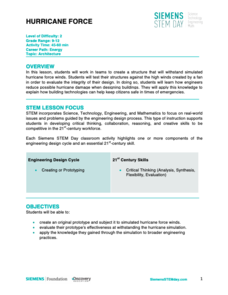Teach Engineering
Clean it Up!
Harness the power of bacteria. Scholars see how using organisms that exist in nature can help solve human problems in the process known as bioremediation. They research and discuss several successful examples, such as using oil-eating...
Chicago Botanic Garden
The Carbon Cycle
There is 30 percent more carbon in the atmosphere today than there was 150 years ago. The first lesson in the four-part series teaches classes about the carbon cycle. Over two to three days, classes make a model of the cycle, add missing...
University of Texas
Multi-wavelength Astronomy
Explore a land far, far away with a well-designed lesson that examines electromagnetic imaging as a way to obtain information about galactic structures. Learners begin to see the importance of looking beyond the visual spectrum to reveal...
Chicago Botanic Garden
Introducing Ecosystem Services
Ecosystems provide many things humans not only use but also need in order to survive. The last activity in the series of seven introduces scholars to the idea of ecosystem services, that ecosystems provide humans with many things we...
Discovery Education
Hurricane Force
It's important to make sure houses can withstand winds. A hands-on activity has learners create a structure out of household materials. They use a fan to simulate hurricane-force winds to see if their structures can withstand the...
University of Colorado
The Jovian Basketball Hoop
A radio receives radio signals, converts them to an electrical signal, then converts this signal to a sound signal, and amplifies the sound so people can hear it. Class members use this information to create a short-wave radio antenna...
Chicago Botanic Garden
Seasons of a Plant
The third in a series of six lessons is an engaging three-part activity defines that discusses phenology, focusing on the cyclic seasons of plants. Pupils then observe phenology outside before determining how climate change can...
Channel Islands Film
Once Upon a Time (Sa Hi Pa Ca): Lesson Plan 3
What was the most significant tool used by the Chumash? How did the environment make the tool possible? What group behaviors allowed the Chumash be be successful for thousands of years? After watching West of the West's documentary Once...
Nazareth College
Create Your Own Tornado
Third graders identify key concepts and definitions about tornados. They work in small groups of three to four to create mini-tornados. After reading Tornado Alert as a class, 3rd graders discuss tornados and fill out a KWL chart.
Kenan Fellows
Microorganisms in Pond Water
That is living in the water? Groups of two to three view pond water with microscopes in order to find microorganisms. They draw pictures of the ones they find in their slides. The groups compare their drawings to pictures of common pond...
Channel Islands Film
Island Rotation: Lesson Plan 4
Foster's Rule? Allopatric speciation? After watching West of the West's documentary Island Rotation, class members use Venn diagrams to compare endemic species on the Channel Islands with mainland related species. They then create a...
Channel Islands Film
Arlington Springs Man: Lesson Plan 4
West of the West's documentary Arlington Springs Man introduces viewers to the remarkable finds on Santa Rosa Island. Archaeologist have discovered on this small island that is part of the Channel island chain, human and pygmy mammoth...













